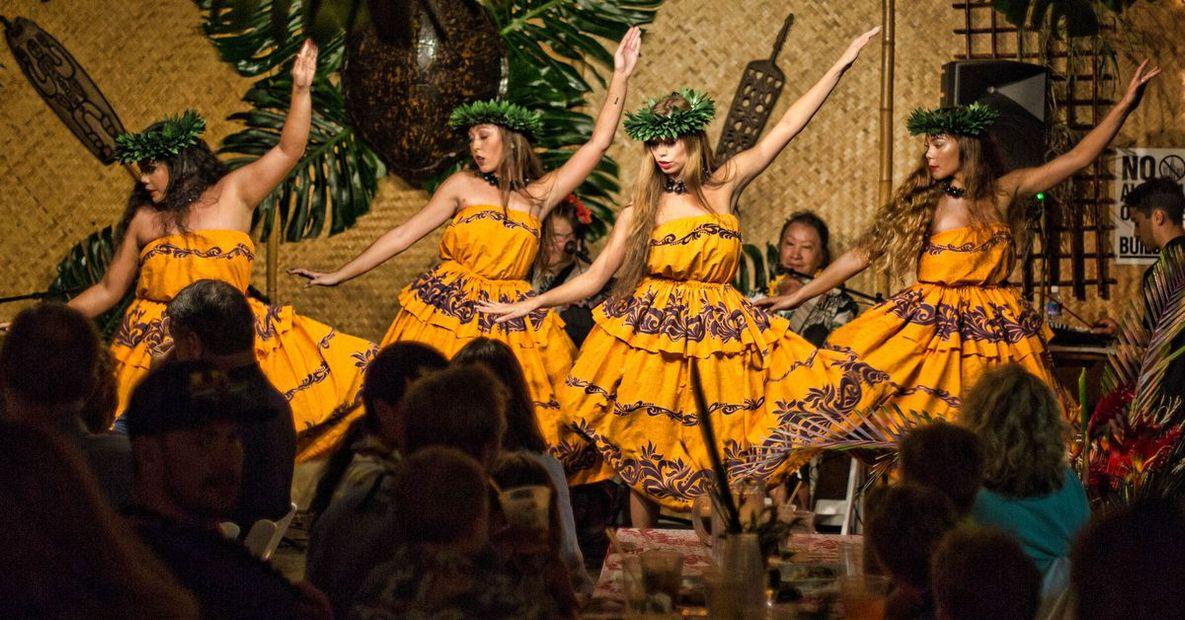Tahiti Nui: The Ideal Tiki Bar

In the tranquil town of Hanalei, where the pace is easygoing and traffic lights are nonexistent, the only interruption to the serenity is the loud crowing of red-tailed roosters as dawn breaks and surfers head to the waves. Situated between a sparkling bay and a backdrop of lush, waterfall-laden mountains, Hanalei perfectly embodies why Kaua‘i is known as the Garden Isle.
However, on a humid Thursday evening at Tahiti Nui, a venerable establishment with a rich history, the scene changes. Patrons, a mix of tourists and locals, are enjoying seared ‘ahi and poisson cru while varying levels of inebriation set in. The intimate space, no bigger than a small store, becomes its own form of entertainment before the reggae band takes the stage.
At one end of the vibrant, burnt-orange bar, a white-haired taro farmer exchanges toasts with a pair of urban German visitors. The room buzzes with the presence of a local character, known as ‘chief,’ who leads a Polynesian sovereignty group challenging U.S. authority in Hawai‘i. Outside on the lanai, teens in Hawaiian shirts devour shrimp pizza under the moonlight. From barefoot surfers to women in heels, everyone gathers to savor perfectly crafted mai tais made from a secret recipe or to indulge in tender kālua pork cooked in a traditional Hawaiian imu.
 A mai tai from Tahiti Nui
PF Bentley
A mai tai from Tahiti Nui
PF BentleyTahiti Nui is far from a typical tiki-themed tourist trap overrun with outdated kitsch or cultural misappropriation. Instead, it features authentic bamboo doorframes and walls adorned with photos from across Polynesia, taken by the Marston family who have run the bar for two generations. Tahiti Nui doesn’t aim to create a manufactured Polynesian fantasy; it embodies the legacy of Louise Teupootehearii Hauta Marston, affectionately known as Auntie Louise, who hails from the French Polynesian island of Tubuai.
Auntie Louise, a descendant of Tahitian royalty and one of 11 siblings, arrived on Kaua‘i’s north shore in 1962 with her husband, a U.S. Air Force lieutenant colonel. She opened a restaurant and bar named after Tahiti’s larger section a year later. This was just after America’s tiki craze, and her establishment served sandwiches, cold beer, and South Pacific artifacts to locals and a few travelers. Over time, tiki decorations were swapped for pool tables, giving locals a fun diversion when the surf was flat or the fishing was poor.
In 1973, Auntie Louise repurposed the pool tables with plywood to create a makeshift buffet line. Locals brought large platters of kālua pork, fresh kala, and hand-pounded poi for a weekly potluck. Auntie Louise charged only for drinks and entertained guests with live music on her guitar, mixing Tahitian, Hawaiian, and American tunes.
 Friends visiting owner Christian Marston and his wife Vera at their home behind Tahiti Nui in Hanalei, Kauaʻi
PF Bentley
Friends visiting owner Christian Marston and his wife Vera at their home behind Tahiti Nui in Hanalei, Kauaʻi
PF BentleyThese lively, often spirited gatherings quickly became the town’s hallmark. “She made leis for everyone who came through the door,” says Christian Marston Sr., current owner of Tahiti Nui and Auntie Louise’s son. “It didn’t matter who you were—whether it was President Carter, Elizabeth Taylor, or a local neighbor. She always made sure everyone felt welcome.”
 A portrait of Auntie Louise, Christian Marston’s mother
PF Bentley
A portrait of Auntie Louise, Christian Marston’s mother
PF BentleyAuntie Louise passed away in 2003, yet her presence endures throughout Tahiti Nui with portraits and paintings adorning the walls. One such portrait captures her almost regal appearance adorned with a crown of leaves and flowers, next to an autographed 8-by-10-inch photo of Jimmy Carter, where the former president extends his best wishes.
At 63, Marston Sr. now runs the bar and is preparing to pass it on to the next generation. Straddling the line between authentic Hawai‘i and the glossy tourism image, his children will need to balance modernization with preserving the bar’s local charm. The 2010 appearance of George Clooney and Beau Bridges in the film The Descendants brought a surge of new, curious patrons to Tahiti Nui.
While the staff no longer bestows hand-crafted leis on each guest and the menu has evolved to include modern dishes like macadamia nut-crusted chicken with liliko‘i and inventive drinks like a green juice cocktail with avocado and other fresh ingredients, Tahiti Nui maintains an authentic charm that many other Polynesian bars struggle to replicate, satisfying both long-time locals and new visitors alike.
As the evening progresses and the bongo rhythms take over, the dance floor fills with people moving to the beat. In these moments, wealth or origins fade away. “People have many names for it,” Marston Sr. notes. “Some call it the Hanalei watering hole, others their favorite bar in the world. For us, it’s simply the Nui. And, as with many things here, some elements remain timeless.”
Brittany Lyte is an award-winning journalist with a presence in both Hawai‘i and New York.PF Bentley, a former TIME Magazine photographer, now works as a photojournalist and documentary filmmaker based on Moloka‘i.

1

2

3

4

5
Evaluation :
5/5